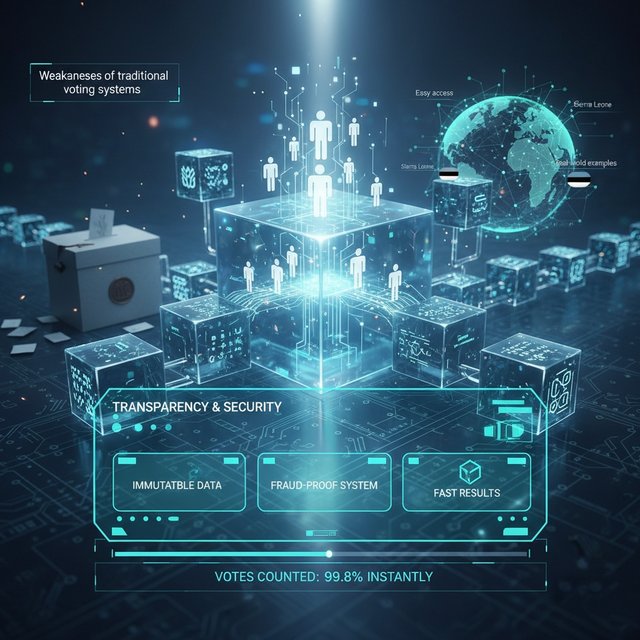Digital democracy
Assalamu Alaikum
There are various problems in the traditional voting system, such as fraud, vote rigging and counting errors. Blockchain technology can open a new horizon in solving these problems, which will make the voting process more transparent, secure and reliable.
Immutable data : The main feature of blockchain is its immutability. Each vote is recorded on the blockchain as a cryptographically encrypted block. Once recorded, it is almost impossible to change or delete it. As a result, no person or institution will be able to change the voting results even if they want to.
Transparency : Each voter's vote is recorded on the blockchain as an anonymous transaction. It can be seen by everyone, but it is not known who voted for whom. As a result, the vote counting process is open to everyone and there is no possibility of any kind of manipulation.
Fraud-proof system : There is a risk of vote theft or fake voting in the traditional system. In a blockchain-based voting system, each voter is given a digital identity or cryptographic key, with which he can vote only once. This makes it impossible to cast fake votes.
Traditional voting systems have several weaknesses, such as long counting processes, inaccurate results, and reduced voter confidence. Blockchain-based voting can eliminate these weaknesses.
Fast results : Counting votes in the traditional system takes a lot of time. In a blockchain system, votes are counted automatically and instantly, resulting in faster results.
Easy access : Going to a polling station can be difficult for many. With blockchain voting, voters can vote securely from anywhere in the world, which can increase voter participation.
Low cost : Paper ballots cost a lot to produce, transport, and count. Blockchain voting systems can reduce these costs.
Blockchain-based voting has been trialled in various countries around the world, and the results have been very positive.
Sierra Leone : In 2018, this country used blockchain to conduct its presidential election. The trial resulted in faster and more accurate vote counting, which increased the efficiency of the electoral commission.
Estonia : Estonia has developed a digital identity system using blockchain technology, known as i-voting. Through it, citizens can vote securely over the internet.
Although blockchain voting is still in its early stages, it has great potential. It can create a new, secure and transparent democratic system that will help increase public trust. Today's discussion concludes here. I hope you've found it interesting. Please share your thoughts on today's topic. Prayers for everyone. May everyone be well. Amen.


Twitter
https://x.com/BokhtiarMr90788/status/1973784399281025162?t=hRJf8RispTHJmNNGI08mhg&s=19
https://x.com/pussmemecoin/status/1973627071181234466?t=hRJf8RispTHJmNNGI08mhg&s=19
https://x.com/BokhtiarMr90788/status/1973784798801076501?t=9MofZIdCxBa-w4zAg7f83Q&s=19
https://coinmarketcap.com/community/post/369036175